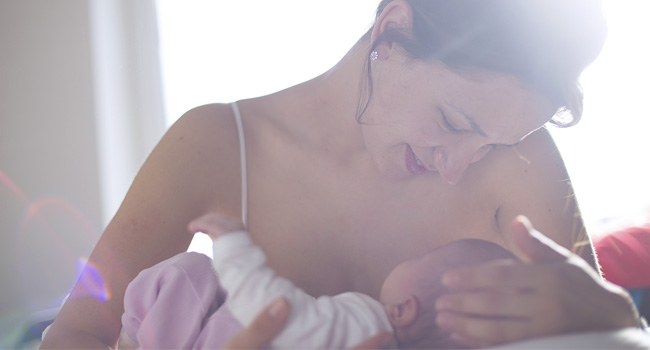The benefits of breastfeeding

Breast milk is your body’s way of producing the perfect food for your new baby. It’s full of all the right nutrients – and is everything a growing infant needs for optimal development and health. It has health benefits for mums too, and helps create a strong bond between mums and their babies.
The best start for your baby
Breast milk is the only food a newborn baby needs, right up until they reach 6 months of age. Along with its full range of nutrients, it also comes with a wide range of other health benefits – some of which may be surprising.
Enhanced immunity
Breast milk is full of immune factors that help protect your baby early in life, as their immune system develops. In the first few days after giving birth new mothers produce a special kind of milk called colostrum, which is particularly rich in the protective factors babies need for immune defence. This makes it a really important time to be breastfeeding. Your baby’s immune system will continue to develop and mature over the next year.
Defence against childhood infections
Breastfed babies are less likely to develop common infections like diarrhoea and gastro-enteritis (partly because they’re at a lower risk of consuming harmful micro-organisms), respiratory, ear or urinary tract infections – which is considered to be linked to the enhanced immunity provided by breast milk.
Promotes visual and cognitive development
Studies suggest that compared to bottle feeding, breastfeeding can have long-term benefits for a child’s cognitive development and visual acuity. These benefits seem to be more pronounced with increased breastfeeding durations.
A closer bond
As you regularly experience closeness and skin-to-skin contact with your baby through breastfeeding, you can both start to form a strong bond with each other.
Lower likelihood of obesity
There is an association between breastfed infants and healthy weight in childhood, adolescence and early adulthood – with breastfed children less likely to become obese. This protective effect seems to increase when children are breastfed for longer, peaking at 9 months.
Could lower the risk of allergies
Breastfeeding is also thought to reduce the likelihood of children developing allergies like allergic rhinitis, wheezing, asthma, dermatitis or food allergies – more evidence is needed to confirm this though.
Lower risk of coeliac and bowel disease
Babies who are breastfed at the same time when gluten (a protein naturally found in many grains) starts to be introduced to their eating plans have a lower risk of developing coeliac disease (an intolerance to gluten). Breast milk may have a protective effect against early-onset inflammatory bowel disease.
Lower risk of chronic diseases
Some studies suggest that breastfeeding is linked to a lower risk of chronic diseases such as cardiovascular disease, type 2 diabetes and high blood pressure later in life.
Lower risk of infant mortality and hospitalisation
Babies who are breastfed, especially those born underweight, have a lower risk of death during their first year of life, including death from sudden infant death syndrome (SIDS), and are also less likely to be hospitalised.
Benefits for mum
Breastfeeding isn’t just beneficial for your baby, there are some wonderful benefits for mothers too. Apart from the obvious convenience – it’s free, pre-prepared and always on hand – it can also contribute to your own health and wellbeing.
Breastfeeding encourages the contraction of the uterus after birth, which will help it return to its pre-pregnancy state. This can reduce post-birth blood loss, and because you lose iron through blood, it also helps protect your iron stores.
Breastfeeding also helps you return to your pre-pregnancy weight more quickly.
What to do if you need help
For some mums, breastfeeding can be challenging, and there are a number of reasons for that. If you’re having trouble, or you’re just not sure how to do it properly, that’s ok. You can get help from your midwife, lactation consultant, doctor or plunket nurse – or you could reach out to other mums who have breastfed and experienced similar challenges.
There’s also some useful information on the Ministry of Health’s website
How long should you breast feed your baby?
It’s going to be a different amount of time for every mum, and it’s something you and your partner will have to decide together. The World Health Organization (WHO) and NZ Ministry of Health (MOH) recommend that babies are breastfed exclusively for the first six months of life to achieve optimal growth, development and health.
This means that during this time breast milk is the only source of nutrition and fluid. When your baby is exclusively breastfeed, your baby won’t need water, any other drinks or any kind of food.
Most women should be able to exclusively breastfeed their infant; however there are some circumstances or medical conditions that may hinder or prevent this. Remember, it can take time to learn how to breastfeed your child and if you find yourself struggling with it, there’s help and support available.
When your baby is around six months of age, it’ll be time to start introducing other foods to your baby’s eating plan, to complement the breast milk. Keep in mind, the NZ MOH has recommended that you continue to breastfeed until your child is at least one year old. While the WHO recommends breastfeeding up to two years of age and beyond.
Some deeper reading
Battersby S (2010) Encouraging and supporting women through breast-feeding. Journal of Family Health Care 20(3):96-99
Ministry of Health (2006) Food and Nutrition Guidelines for Healthy Pregnant and Breastfeeding Women: A background paper. Wellington: Ministry of Health.
Ministry of Health, Breastfeeding is perfect for you and your baby - accessed 10 December 2015
National Health and Medical Research Council (2012) Infant feeding guidelines. Information for health workers. Canberra: National Health and Medical Research Council.